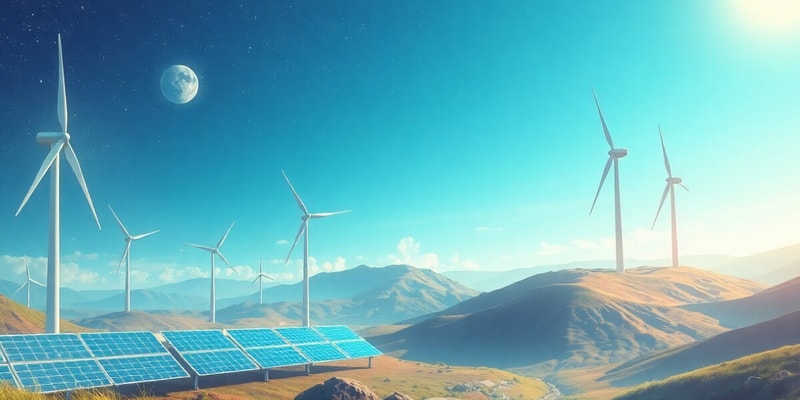Podcast
Questions and Answers
The two main sources of renewable energy are the Sun and the Moon.
The two main sources of renewable energy are the Sun and the Moon.
False
Fusion is the process by which nuclei are split apart to release energy.
Fusion is the process by which nuclei are split apart to release energy.
False
Humans can harness energy from moving water and wind as renewable energy sources.
Humans can harness energy from moving water and wind as renewable energy sources.
True
Nuclear fission is responsible for the energy produced by the Sun.
Nuclear fission is responsible for the energy produced by the Sun.
Signup and view all the answers
Renewable resources cannot become nonrenewable.
Renewable resources cannot become nonrenewable.
Signup and view all the answers
Energy from within Earth is derived from the decay of fossil fuels and solar energy.
Energy from within Earth is derived from the decay of fossil fuels and solar energy.
Signup and view all the answers
Solar energy can affect the movement of air masses and plant growth.
Solar energy can affect the movement of air masses and plant growth.
Signup and view all the answers
Trees are considered a nonrenewable resource because they take a long time to grow.
Trees are considered a nonrenewable resource because they take a long time to grow.
Signup and view all the answers
Wind energy is considered a nonrenewable energy resource.
Wind energy is considered a nonrenewable energy resource.
Signup and view all the answers
Hydroelectric energy is produced by harnessing the energy of flowing water.
Hydroelectric energy is produced by harnessing the energy of flowing water.
Signup and view all the answers
The primary disadvantage of wind energy is its inability to generate electricity.
The primary disadvantage of wind energy is its inability to generate electricity.
Signup and view all the answers
Wind farms can be located anywhere without consideration for wind availability.
Wind farms can be located anywhere without consideration for wind availability.
Signup and view all the answers
The energy produced by a dam is primarily used for agricultural purposes.
The energy produced by a dam is primarily used for agricultural purposes.
Signup and view all the answers
The water cycle is unaffected by solar energy.
The water cycle is unaffected by solar energy.
Signup and view all the answers
Wind turbines can only be installed in areas with high wind speeds.
Wind turbines can only be installed in areas with high wind speeds.
Signup and view all the answers
Wind energy has no environmental impact.
Wind energy has no environmental impact.
Signup and view all the answers
Windmills have historically been used to pump water and grind grain.
Windmills have historically been used to pump water and grind grain.
Signup and view all the answers
Nonrenewable resources cannot be replenished once used.
Nonrenewable resources cannot be replenished once used.
Signup and view all the answers
Hydroelectric energy is effective only in areas with a significant amount of flowing water.
Hydroelectric energy is effective only in areas with a significant amount of flowing water.
Signup and view all the answers
The cost of building hydroelectric dams is inexpensive.
The cost of building hydroelectric dams is inexpensive.
Signup and view all the answers
Solar energy can only be used for heating buildings.
Solar energy can only be used for heating buildings.
Signup and view all the answers
Heat absorbed by liquids in solar collectors can be used for various household purposes.
Heat absorbed by liquids in solar collectors can be used for various household purposes.
Signup and view all the answers
The only pollution created by solar heating systems occurs in the use of the solar energy itself.
The only pollution created by solar heating systems occurs in the use of the solar energy itself.
Signup and view all the answers
Photovoltaic cells can generate electricity directly from sunlight.
Photovoltaic cells can generate electricity directly from sunlight.
Signup and view all the answers
Solar power plants can be built in any location regardless of sunlight availability.
Solar power plants can be built in any location regardless of sunlight availability.
Signup and view all the answers
Plants convert chemical energy into light energy through photosynthesis.
Plants convert chemical energy into light energy through photosynthesis.
Signup and view all the answers
Joining multiple photovoltaic cells together is necessary to increase electricity production.
Joining multiple photovoltaic cells together is necessary to increase electricity production.
Signup and view all the answers
Solar heating systems are efficient regardless of the amount of sunlight available.
Solar heating systems are efficient regardless of the amount of sunlight available.
Signup and view all the answers
Biomass is considered a renewable resource because it can be replaced relatively quickly.
Biomass is considered a renewable resource because it can be replaced relatively quickly.
Signup and view all the answers
Peat is regarded as a renewable resource because it forms quickly.
Peat is regarded as a renewable resource because it forms quickly.
Signup and view all the answers
Ethanol, produced from biomass, can only be used as a standalone fuel.
Ethanol, produced from biomass, can only be used as a standalone fuel.
Signup and view all the answers
Over 1,000 liters of ethanol can be produced from one acre of corn.
Over 1,000 liters of ethanol can be produced from one acre of corn.
Signup and view all the answers
Geothermal energy is derived from heat produced by the sun.
Geothermal energy is derived from heat produced by the sun.
Signup and view all the answers
Hot springs and geysers are signs of geothermal energy close to the Earth's surface.
Hot springs and geysers are signs of geothermal energy close to the Earth's surface.
Signup and view all the answers
Biomass burning does not produce any pollutants.
Biomass burning does not produce any pollutants.
Signup and view all the answers
Microbes help convert sugars from plants into ethanol.
Microbes help convert sugars from plants into ethanol.
Signup and view all the answers
Geothermal energy can be used to both heat and cool buildings.
Geothermal energy can be used to both heat and cool buildings.
Signup and view all the answers
Animal waste is not considered a part of biomass.
Animal waste is not considered a part of biomass.
Signup and view all the answers
Geothermal energy will be available for a long time because Earth's core is very hot for billions of years.
Geothermal energy will be available for a long time because Earth's core is very hot for billions of years.
Signup and view all the answers
Human activity can have positive effects on Earth's resources.
Human activity can have positive effects on Earth's resources.
Signup and view all the answers
Renewable energy resources are guaranteed to never run out.
Renewable energy resources are guaranteed to never run out.
Signup and view all the answers
Solar energy is considered the most widely utilized renewable energy resource in the United States.
Solar energy is considered the most widely utilized renewable energy resource in the United States.
Signup and view all the answers
Geothermal energy is harnessed from the heat produced by the decay of organic matter.
Geothermal energy is harnessed from the heat produced by the decay of organic matter.
Signup and view all the answers
Study Notes
Renewable Energy Resources
- Main sources: Sun and Earth.
- Sun's energy: Nuclear fusion produces light and heat, driving wind, ocean currents, and plant growth.
- Earth's energy: Nuclear fission of radioactive elements and energy from Earth's formation generate heat.
Wind Energy
- Created by uneven solar heating of air masses.
- Harnessed by wind turbines in wind farms.
- Advantages: Renewable, clean energy production.
- Disadvantages: Location-specific, expensive equipment, bird hazards, and some pollution from equipment production/maintenance.
Hydroelectric Energy
- Uses kinetic energy of moving water.
- Renewable due to the water cycle.
- Advantages: Reliable energy source in suitable locations.
- Disadvantages: Expensive infrastructure, potential disruption to fish migration.
Solar Energy
- Heat: Solar collectors use liquids (e.g., water) to absorb and transfer heat for building and water heating. Minimal pollution from equipment.
- Electricity: Photovoltaic cells convert sunlight directly into electricity; solar power plants use heated fluids to generate steam and turn turbines. Requires sufficient sunlight and space; expensive to build and maintain.
Biomass Energy
- Plants and animal waste contain chemical energy.
-
Burning biomass: Releases energy for cooking, heating, or powering engines; inexpensive and renewable (mostly).
- Some biomass (peat) renews slowly and is considered nonrenewable in areas of heavy use. Causes pollution.
- Ethanol production: Microbes break down plant sugars/cellulose to produce ethanol, a liquid fuel; can be mixed with gasoline. Low yield; large areas needed for ethanol production, e.g., 40% of a corn harvest provides only 10% of US car fuel.
Geothermal Energy
- Heat from Earth's interior heats groundwater, forming hot springs and geysers.
- Heat: Used directly for building heating and cooling with closed-loop systems.
- Electricity: Steam and hot water from underground spin turbines to generate electricity.
- Advantages: Long-lasting, reliable energy source.
- Disadvantages: Expensive technology, pollution from equipment manufacturing/maintenance.
Nonrenewable vs. Renewable Resources
- Nonrenewable: Depleted faster than they can be replaced.
- Renewable: Replaced nearly as fast as they are used; can become nonrenewable through unsustainable practices (e.g., deforestation).
Conservation of Renewable Resources
- Even renewable resources need conservation due to limitations in sustainable practices and infrastructure. Example: Deforestation can make sustainably harvested trees a non-renewable resource.
Energy Resource Definition
- A natural resource used to generate electricity and other forms of energy.
Biomass Definition
- Organic matter from plants and animal waste containing stored energy.
Studying That Suits You
Use AI to generate personalized quizzes and flashcards to suit your learning preferences.
Related Documents
Description
Test your knowledge on renewable energy sources such as solar, wind, and hydroelectric energy. This quiz explores the advantages and disadvantages of each type, their methods of harnessing energy, and the science behind them. Perfect for students and enthusiasts of environmental science!




